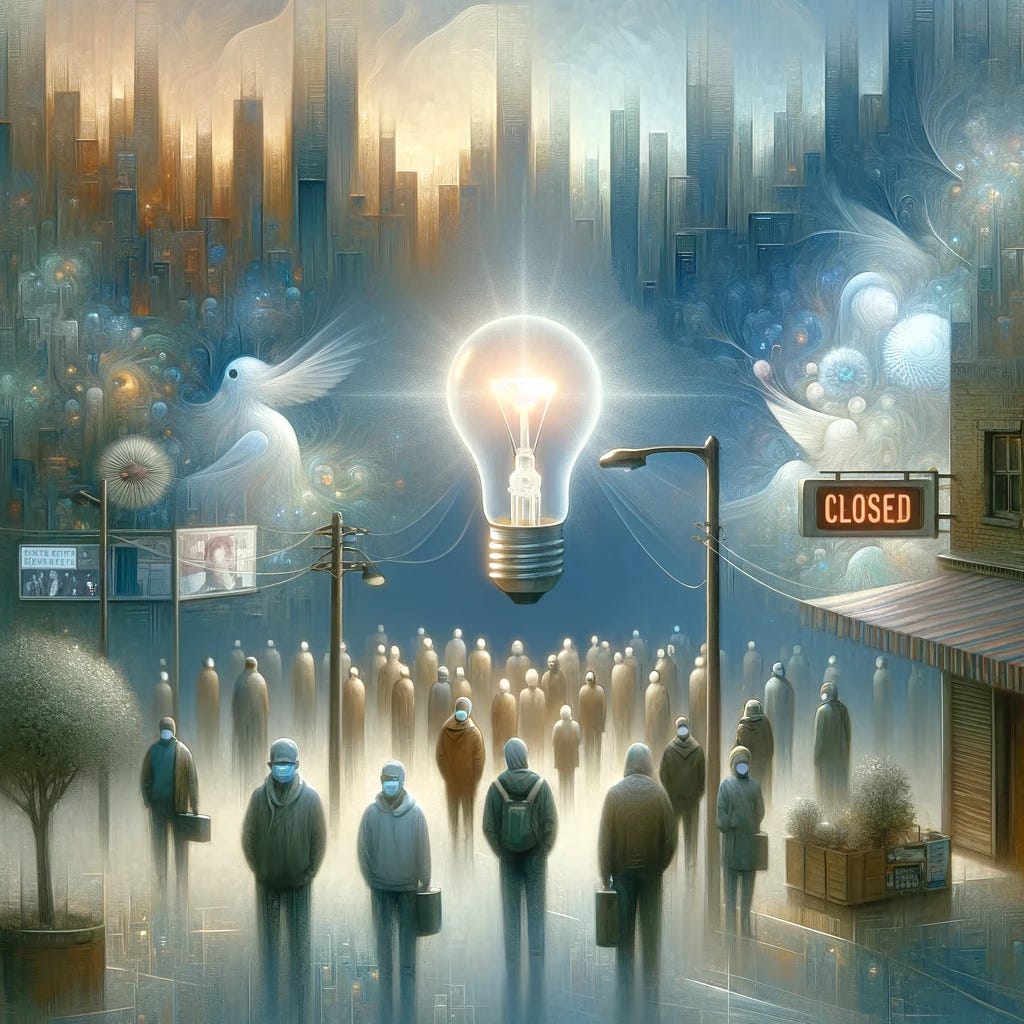Dear Readers,
What if you could close a generational gap by leaping at the right time?
You would probably want to; however, these are often some of our most significant leaps. It’s because generational gaps are not only delineated by time but also by experience.
Call it the movie theater of life. Wait, are we actually in a simulation?
What if all your friends visited the same movie theater and saw different shows? Each would come back with distinctly different experiences to share. What if they saw the show at other times of the day or even on different days of the week? In a lovely neighborhood? Or in a bad area of town? All the nuances would result in different outcomes. What if a large group, as is often the case, went together?
Generations are the sum of our collective experiences, mostly centered around the periods and places in which we grew up.
The timing of noteworthy experiences is vital to generational definitions. The leaps we take in life often mirror our adventures: a blend of strategy, skill, and luck. Or they become a reflection of your first radio, television, car, mobile phone, or even the first Apps you connected to the world with and through.
It all depends on which generation you call your own. Because of when you grew up, you likely related more specifically to one of the examples above.
Generation Gaps and Changing Times: For Gen X (my generation), we learned by repeating patterns. Over and over and over again. Especially so with video games.
Meanwhile, Gen Z plays video games differently. They can save their lives and levels in today’s format, a foreign concept to many Gen Xers. That’s right. Once you reach the next level, save the game, and you never have to level down again. You aren’t going back. You don’t have to start over. Just keep up-leveling. Up. Up. And Away.
One way isn’t right or wrong. It’s the format of the experience. It's a feature, if you will, not a bug—in either direction.
These differences in psychology create distinctions in society. For many, they manifest as hard-wired generational gaps with both positive and negative repercussions.
Consider the core memory of the global pandemic.
Do you remember where you were when the pandemic became real? No, really, real- not just something you’d heard about on the news, but an event that began to impact you and your family. It was probably a big deal to you.
Psychologists refer to moments that we associate with significant events as flashbulb memories. Flashbulb memories often occur when the event is unexpected and tend to be remembered vividly—almost as if they’d happened yesterday, despite years having gone by.
Do you remember where you were when the world closed?
The flashbulb’s intensity, as well as the recency of the pandemic, will align current generations in many ways.
It’s reasonable to surmise that current generations, especially younger generations, will solve their problems differently. And why not? Governments —large and small— attempted to deliver solutions. A virus united the entire world. The outcome was uncertain; however, the experience was aligned.
What’s to come of a world where we have high expectations for our governments in crises? Arguably less happiness. Expectations are inversely related to satisfaction. The higher your expectations, the lower your happiness.
Suppose you’re looking to find generational happiness—different than generational wealth. In that case, you should know that studies show that people with stable economies, strong social support systems, and effective governance typically report higher happiness levels.
The happiest generation of all? After a cursory internet search, the happiest generation is typically cited as the Silent Generation (born between 1925 and 1945). We might become more content as we age due to the social networks and life experiences we’ve seen and shared.
The least happy? The young adults of Generation Z (born 1997-2012) have the market covered on generalized anxieties as concerns about social media, climate change, economic uncertainty, and even the aforementioned global pandemic take their toll. All generations have fears; however, this group wants to do something about them.
How, then, do we make progress through the years? We look back before we leap forward and acknowledge that age and experiences are key factors in bridging gaps. So, too, is the reality that many generations move away from their predecessors' mistakes.
Generational Leaps - A History of Progress
The leaps taken by different generations define the zeitgeist of the eras.
Silent Generation grew up during the hardships of the Great Depression and World War II and is known to be all about hard work and perseverance.
Baby Boomers leaped into suburban growth and the civil rights movement, laying down societal frameworks for years to come that their predecessors lacked.
Generation X jumped into the digital age, adapting to new technologies and ideologies.
Generation Y (millennials) leaped onto a more global stage with social media and the gig economy. They took the technology much further than the previous generation could have imagined.
And Generation Z? They're in mid-leap, pushing for social justice, and are better at setting boundaries than their predecessors.
Each time, no matter your generation, it’s worth planting your foot firmly and moving forward to secure your distance and opportunity within your generational moment(s) and movement(s)—think like a triple jumper.
Recognizing the leaps societies, families, and individuals make helps to frame one's current and future state. Knowing ahead of time that life is a series of hops helps propel us to new areas more adeptly.
Understanding Our Collective Progress: Each generational leap pushes humanity forward yet creates gaps. Much of what’s been changing has recently been the beast of technology, which shows no sign of stopping.
Artificial Intelligence (AI) will likely be one of the subsequent dynamics that helps reshape this next generation. From an agricultural age to an industrial age to an information age to one of artificial intelligence, it doesn’t take long—less than 100 years by my watch for this leap to occur. Yet, it’s likely to be the most significant one.
This is not because of the recency effect or the uncertainty involved but because computing power doesn’t sleep. Farmers, workers, and, to a lesser degree, content creators take breaks. Meanwhile, AI moves forward at full warp speed.
Continuous Leaping: As we continue to jump from one stage of life to another, from one generation to another, let's remember the joy that can be found in the change. It’s part of personal growth, professional advancement, and societal change.
If you don’t understand or see the perspective of one generation to another, that’s an opportunity for you to leap. In so doing, you will help close the gaps that we all experience from time to time.
In the end, may your leaps in solving generational gaps be brave, your landings sure, and your journey through life an adventure.
What a Great Time to Be Alive,
Jim Flint







Enjoyed our generational gap discussions this weekend!!! “Come together with love!”